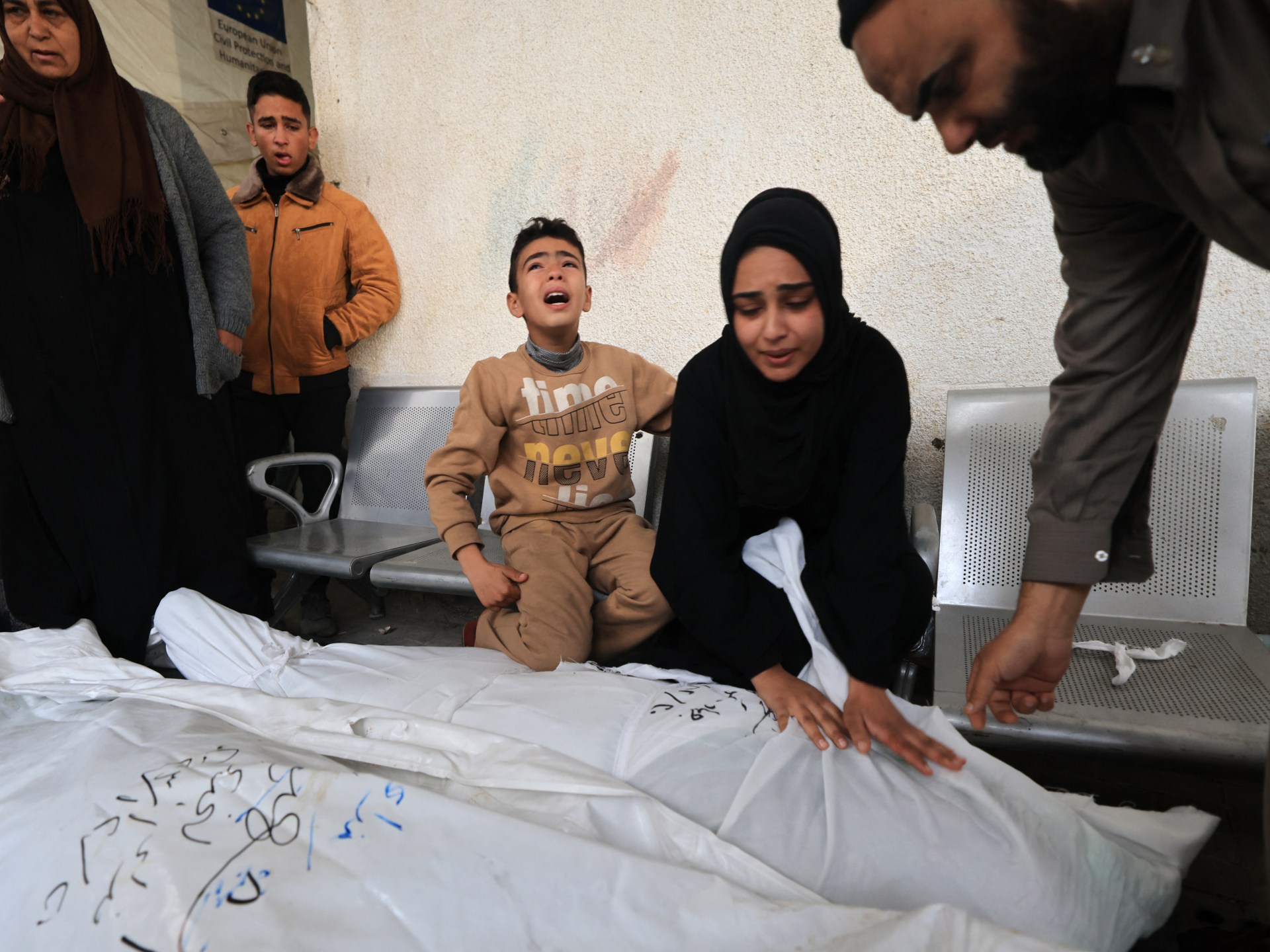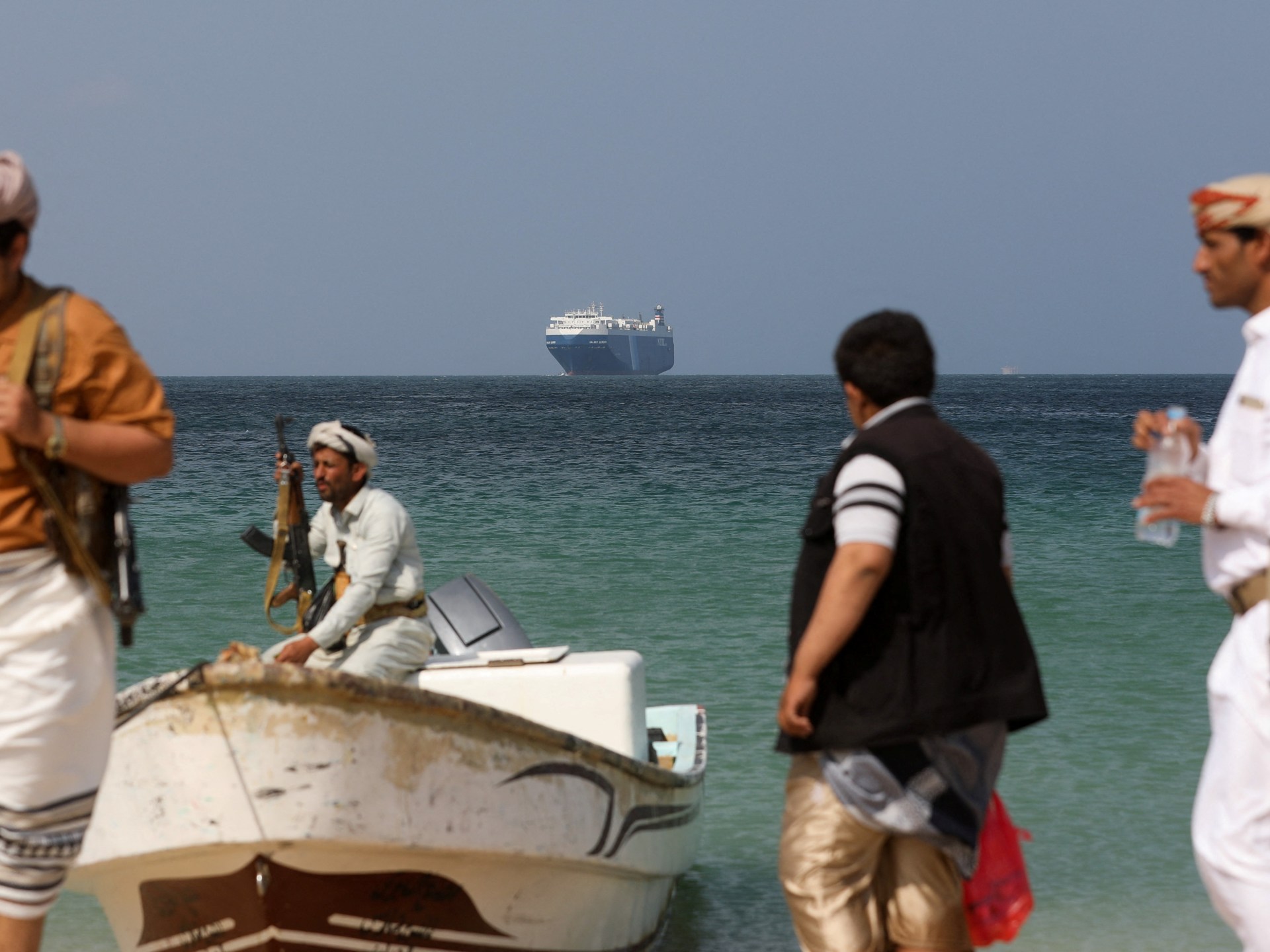
WASHINGTON (AP) — U.S. and British militaries bombed more than a dozen Iran-backed Houthis sites in Yemen with warship- and submarine-launched Tomahawk missiles and warplanes on Thursday in a massive retaliatory strike, U.S. officials said.
The U.S. Air Force Middle East Command said it hit over 60 targets at 16 locations in Yemen, including “command and control nodes, ammunition depots, launch systems, production facilities and air defense radar systems.”
President Joe Biden said the attacks were intended to show that the US and its allies “will not tolerate” the militant group’s incessant attacks on the Red Sea. And he said they made the move only after attempts at diplomatic negotiations and careful consideration.
“These attacks are a direct response to unprecedented Houthi attacks on international maritime vessels in the Red Sea – including the use of anti-ship ballistic missiles for the first time in history,” Biden said in a statement. Noting that the attacks endangered U.S. personnel and civilian sailors and jeopardized trade, he added: “I will not hesitate to take further action as necessary to protect our people and the free flow of international trade.”
Associated Press journalists in Yemen’s capital Sanaa heard four explosions early Friday local time. Two residents of Hodieda, Amin Ali Saleh and Hani Ahmed, said they heard five powerful explosions that hit the western port area of the city, which lies on the Red Sea and is the largest port city controlled by the Houthis. Eyewitnesses who spoke to the AP also said they saw strikes in Taiz and Dhamar, towns south of Sanaa.
The attacks were the first U.S. military response to the ongoing campaign of drone and missile attacks on commercial vessels since the start of the war between Israel and Hamas. And the coordinated military attack comes just a week after the White House and a number of partner countries issued a final warning to the Houthis to stop attacks or face a possible military strike. The officials described the attacks on condition of anonymity to discuss military operations. Members of Congress were informed of the strike plans earlier Thursday.
The warning appeared to have had at least a temporary effect, as attacks ceased for several days. However, on Tuesday, Houthi rebels fired their largest-ever drone and missile barrage on ships in the Red Sea. U.S. and British ships and American fighter aircraft responded by shooting down 18 drones, two cruise missiles and an anti-ship missile. And on Thursday, the Houthis fired an anti-ship ballistic missile into the Gulf of Aden that was seen by a merchant vessel but did not hit the vessel.
In a call with reporters, senior administration and military officials said that after Tuesday’s attacks, Biden had convened his national security team and had been presented with military options for a response. He then ordered Defense Secretary Lloyd Austin, who remains hospitalized with complications from prostate cancer surgery, to carry out the retaliatory strikes.
In a separate statement, British Prime Minister Rishi Sunak said the Royal Air Force had carried out targeted strikes against military facilities used by the Houthis. The Defense Ministry said four warplanes based in Cyprus were involved in the attacks.
He noted that the militants had carried out a series of dangerous attacks on shipping, adding: “This cannot be sustained.” He said the UK had taken “limited, necessary and proportionate measures in self-defence, along with “The United States and with non-operational support from the Netherlands, Canada and Bahrain against targets associated with these attacks to weaken Houthi military capabilities and protect global shipping.”
The governments of Australia, Bahrain, Canada, Denmark, Germany, the Netherlands, New Zealand and South Korea, along with the US and the UK, issued a statement saying that while the aim was to defuse tensions and promote stability in the Red Sea, but allies will not hesitate to defend lives and protect commerce in the critical waterway.
However, Russia requested an emergency UN Security Council meeting on the attacks. France, the current council leader, said it would take place on Friday afternoon.
The rebels, who have carried out 27 attacks with dozens of drones and missiles since November 19 alone, had warned that any attack by American forces on their locations in Yemen would trigger a violent military response.
A senior Houthi official, Ali al-Qahoum, announced retaliation. “The battle will be greater… and beyond the imagination and expectations of the Americans and the British,” he said in a post on X.
Al-Masirah, a Houthi-operated satellite news channel, described attacks on the Al-Dailami air base north of Sanaa, the airport in the port city of Hodeida, a camp east of Saada, the airport in the city of Taiz and an airport near Hajjah .
The Houthis said later on Friday that five of their troops were killed and six were wounded in the attacks.
A senior administration official said that while the U.S. expects the attacks would impact the Houthis’ capabilities, “we wouldn’t be surprised if there was a response,” although it hasn’t seen anything yet. Officials said the U.S. deployed fighter jets based on the Navy aircraft carrier USS Dwight D. Eisenhower and Air Force fighter jets, while the Tomahawk missiles were fired from Navy destroyers and a submarine.
The Houthis say their attacks are aimed at stopping Israel’s war against Hamas in the Gaza Strip. But their targets have increasingly little or no connection to Israel, endangering an important trade route connecting Asia and the Middle East with Europe.
Meanwhile, the UN Security Council passed a resolution on Wednesday calling on the Houthis to immediately stop attacks and implicitly condemning their arms supplier Iran. It was approved by a vote of 11-0 with four abstentions – from Russia, China, Algeria and Mozambique.
Britain’s involvement in the attacks underscores the Biden administration’s efforts to deploy a broad international coalition to combat the Houthis, rather than appearing to be going it alone. More than 20 nations are already participating in a U.S.-led maritime mission to improve shipping protection in the Red Sea.
U.S. officials had refused for weeks to signal when international patience would run out and they would strike back against the Houthis, even as several commercial ships were hit by missiles and drones, prompting companies to consider rerouting their ships .
On Wednesday, however, US officials again warned of consequences.
“I’m not going to telegraph anything or predict what might happen,” Secretary of State Antony Blinken told reporters during a stop in Bahrain. He said the U.S. has made it clear “that if things continue like they did yesterday, there will be consequences.” And I’ll leave it at that.”
The Biden administration’s reluctance to retaliate in recent months reflected political sensitivities and was largely due to broader concerns that Yemen’s shaky ceasefire could be unraveled and spark a wider conflict in the region. The White House wants to preserve the ceasefire and is wary of taking actions in Yemen that could open another war front.
However, the impact on international shipping and escalating attacks triggered the coalition warning signed by the United States, Australia, Bahrain, Belgium, Canada, Denmark, Germany, Italy, Japan, the Netherlands, New Zealand, Singapore and the United States Kingdom.
The Red Sea transit, from the Suez Canal to the Bab el-Mandeb Strait, is a crucial shipping route for global trade. About 12% of world trade typically passes through the waterway that separates Africa and the Arabian Peninsula, including oil, natural gas, grain and everything from toys to electronics.
In response to the attacks, the US launched a new maritime security mission called Operation Prosperity Guardian to increase security in the Red Sea, the Bab el-Mandeb Strait and the Gulf of Aden, involving some 22 countries . Warships from the United States and other nations regularly sail through the narrow strait to protect ships and deter attacks. The coalition has also increased air surveillance.
The decision to set up the expanded patrol operation came after three merchant ships were hit by missiles fired by Houthis in Yemen on December 3.
The Pentagon increased its military presence in the region after the Hamas attacks in Israel on October 7 to deter Iran from escalating the war into a regional conflict, including through the Houthis and Iranian-backed militias in Iraq and Syria.
____
Associated Press writers Ahmed al-Haj in Sanaa, Yemen; Jack Jeffery in London; Jon Gambrell in Dubai, United Arab Emirates; Edith M. Lederer at the United Nations; and Zeke Miller, Aamer Madhani and Seung Min Kim in Washington contributed to this report.






Recent Comments